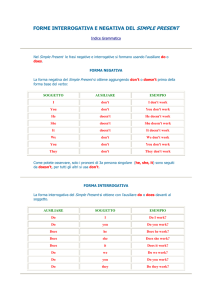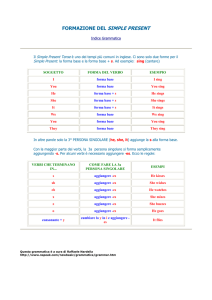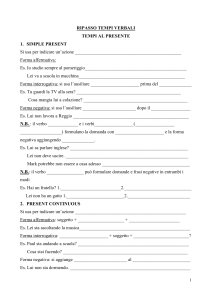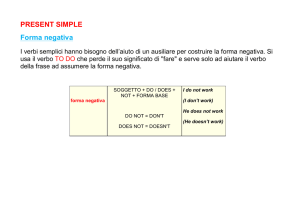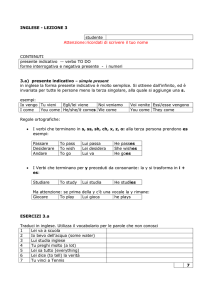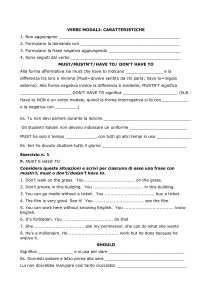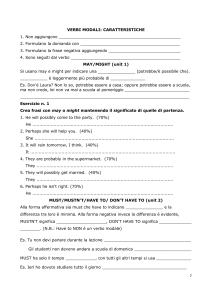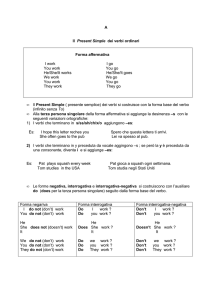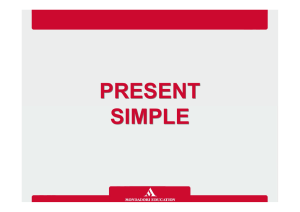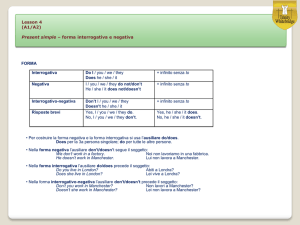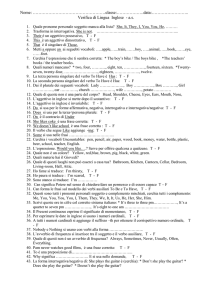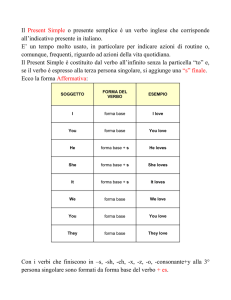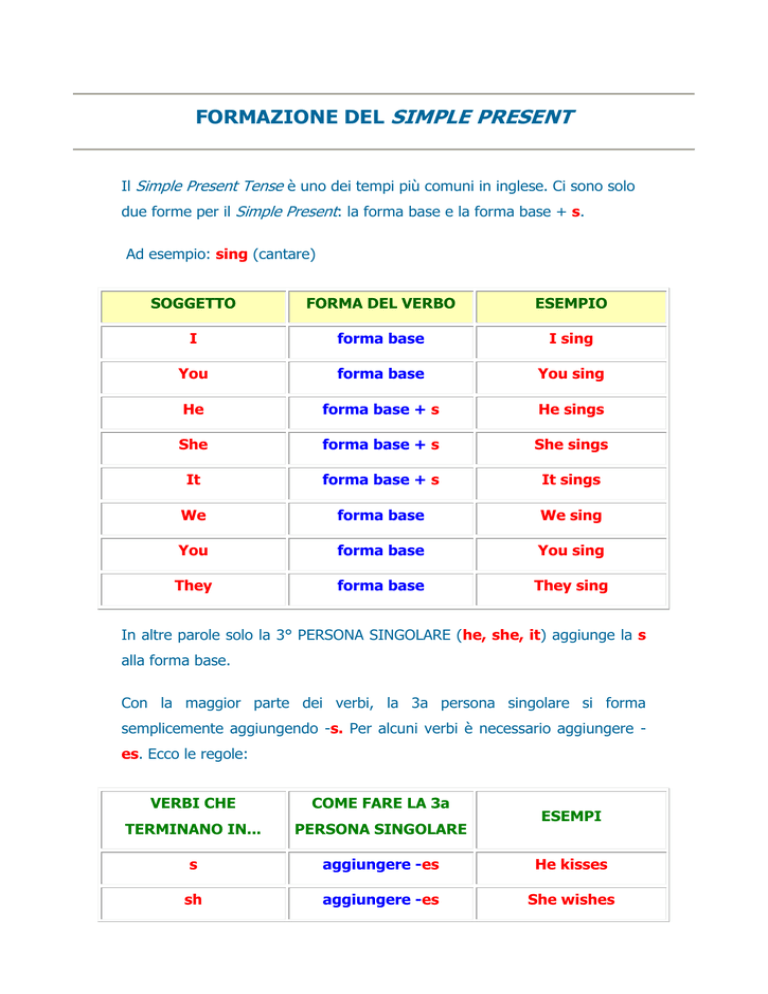
FORMAZIONE DEL SIMPLE PRESENT
Il Simple Present Tense è uno dei tempi più comuni in inglese. Ci sono solo
due forme per il Simple Present: la forma base e la forma base + s.
Ad esempio: sing (cantare)
SOGGETTO
FORMA DEL VERBO
ESEMPIO
I
forma base
I sing
You
forma base
You sing
He
forma base + s
He sings
She
forma base + s
She sings
It
forma base + s
It sings
We
forma base
We sing
You
forma base
You sing
They
forma base
They sing
In altre parole solo la 3° PERSONA SINGOLARE (he, she, it) aggiunge la s
alla forma base.
Con la maggior parte dei verbi, la 3a persona singolare si forma
semplicemente aggiungendo -s. Per alcuni verbi è necessario aggiungere es. Ecco le regole:
VERBI CHE
COME FARE LA 3a
TERMINANO IN...
PERSONA SINGOLARE
s
aggiungere -es
He kisses
sh
aggiungere -es
She wishes
ESEMPI
ch
aggiungere -es
He watches
x
aggiungere -es
She mixes
z
aggiungere -es
She buzzes
o
aggiungere -es
He goes
consonante + y
cambiare la y in i e
aggiungere -es
It flies
FORME INTERROGATIVA E NEGATIVA DEL
SIMPLE PRESENT
Nel Simple Present le frasi negative e interrogative si formano usando
l'ausiliare do o does.
FORMA NEGATIVA
La forma negativa del Simple Present si ottiene aggiungendo don't o
doesn't prima della forma base del verbo:
SOGGETTO
AUSILIARE
ESEMPIO
I
don't
I don't work
You
don't
You don't work
He
doesn't
He doesn't work
She
doesn't
She doesn't work
It
doesn't
It doesn't work
We
don't
We don't work
You
don't
You don't work
They
don't
They don't work
Come potete osservare, solo i pronomi di 3a persona singolare (he, she, it)
sono seguiti da doesn't, per tutti gli altri si usa don't.
FORMA INTERROGATIVA
La forma interrogativa del Simple Present si ottiene con l'ausiliare do o
does davanti al soggetto.
AUSILIARE
SOGGETTO
ESEMPIO
Do
I
Do I work?
Do
you
Do you work?
Does
he
Does he work?
Does
she
Does she work?
Does
it
Does it work?
Do
we
Do we work?
Do
you
Do you work?
Do
they
Do they work?
FORMAZIONE DELLE WH- QUESTIONS
Le Wh- questions (domande che usano aggettivi e pronomi interrogativi
come What, Where, Why, When, Which, Who) si formano ponendo
l'aggettivo o pronome interrogativo Wh- all'inizio della frase interrogativa.
Eccone degli esempi:
AFFERMATIVA
INTERROGATIVA
WH- QUESTIONS
They work
Do they work?
Why do they work?
You study
Do you study?
What do you study?
She drives
Does she drive?
Which car does she
drive?
Quando who oppure what sono soggetto della frase non si usa does.
Esempio:
Who speaks English? = Chi parla l?Inglese?
What happens? = Cosa accade?
Attenzione! Quando TO HAVE viene usato con significati diversi da possedere non
usa il rafforzativo GOT e le forme negativa, interrogativa e interrogativa-negativa si
costruiscono con gli ausiliari DO/DOES
Es:
I have a shower every morning (“Faccio la doccia ogni mattina”)
I don’t have lunch at 12 (“Non pranzo alle 12”)
Does she have breakfast alone? (“Fa colazione da sola?”)
RISPOSTE BREVI
Le risposte brevi corrispondono a quando in italiano si risponde semplicemente
"sì" oppure "no". Nella lingua inglese non si risponde semplicemente "yes"
oppure "no", ma si aggiunge soggetto e verbo ausiliare. Nelle risposte brevi si
usa sempre il pronome.
Esempio: -Parli Inglese?
-Do you speak English?
-Si.
-Yes, I do
-Mary parla Inglese?
-Does Mary speak English?
-No.
-No, she doesn’t

